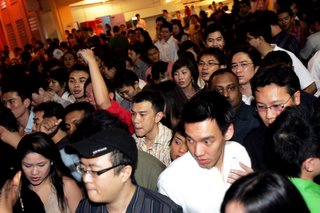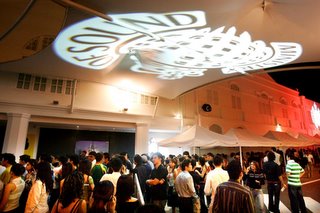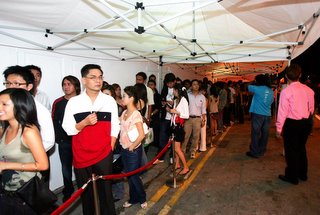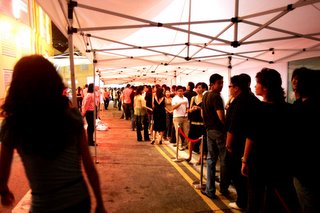CLUBBERS to Ministry of Sound: We're sick and tired of queuing. Just let us in. Since the British superclub's opening on 16 Dec, fun-seekers have had to queue to get into the club, waiting for up to two hours in lines that have stretched right to Coleman Bridge 250m away.

For what, they wonder. Once inside, they find that the club is only half full. Ms Yolanda Zhuang, 20, queued for two hours on the opening night of Ministry of Sound (MOS) before being turned away due to capacity problems. A member of the MOS staff came out, apologised and issued cards that gave patrons 50 per cent off on their next entry. Miss Zhuang, like many other clubbers, was given an invitation card that allowed her in free after 9pm for the opening night. Despite her displeasure, she returned to the club another two times after that day. Both times, she was able to get in, but only after two hours of waiting. She claimed that when she finally got into the club on both occasions, it was not full.

The club has a capacity of 3,160 people. 'I like the music at MOS, but I had to queue for two hours in a nice dress and the weather was quite warm. It just spoilt my mood to club. I did not feel like staying long after getting in,' said the civil servant. Her experience echoes that of many other clubbers at MOS. Advertising executive Lawrence Lee, 24, went to MOS twice after the opening night and managed to bypass the queue as he knew some of the staff members. 'After leaving the club at 2am, there were still long queues outside, but the club was not crowded inside as I could still get tables and seats,' said Mr Lee. Clubbers who were interviewed claimed that the door policy they observed was such that five people would be allowed in, but only if five people came out, and that was even when the club did not look like it was at full capacity. CLUB ACKNOWLEDGES PROBLEM The massive queues have led many clubbers to complain to the management. An apology was sent via e-mail to clubbers on the MOS mailing list on 7 Jan. In it, the club promised that the problem would be rectified as soon as possible. It led to the dismissal of the club's general manager, Mr Terry Lumb, a week ago. The queues have got significantly shorter since then, according to clubbers. But why the long queues in the first place? Could the queues have added to the perception that it's a 'hot' club? 'Basically, if you are inside, you are exclusive. But if you are in the queue, you are just a normal guy,' said Mr Lee. To be fair, industry players say that long queues can result from many reasons. According to both Mr Simon Lim, managing director of the Wong San's Group, and Zouk's marketing manager Tracy Phillips, clubbers sometimes have to wait to get into their clubs because of stringent security checks or a maxed-out club capacity. Queues are common in clubs overseas, according to some clubbers and industry people. New Zealand expatriate Daniel Dominey, 33, has been to clubs in New Zealand, Australia and Singapore for 15 years and has worked in them as a security officer.

CREATE HYPE He said his former employers have adopted that tactic to create hype about the place. Mr Andrew Ing, chief operating officer at St James Power Station and former marketing manager of Zouk, has seen similar queues in three clubs in Miami and at Twilo in New York City. 'But long queues have died down somewhat. It now mainly applies to celebrity clubs that people like Paris Hilton go to.' But he does not see it happening in Asia. 'It may have to do with the losing-face mentality,' he said. Organisers who hold events in local clubs like Zouk might occasionally hold up the crowd before the event so that there is a rush when the doors open, according to Ms Phillips. 'It only happens sometimes before the event, though,' she said. However, using queues as a marketing ploy just does not make sense to clubber Kevin Sim. Said the 20-year-old: 'Since a club makes money from people buying drinks, doesn't it make more financial sense to let them in, rather than wait outside?' MOS was contacted for this report, but declined comment.
'Dismissal too harsh'

MR Clement Lee, executive director of Lifebrandz, which owns the local franchise for Minsitry of Sound (MOS), said in a recent report that the queue problem was the reason for general manager Terry Lumb's dismissal. However, industry players and clubbers feel that the move, if true, might have been a little too harsh. 'Yes, an international brand with more than 15 years' experience in clubbing should have no excuse for a queue problem in the first place, but to dismiss a person just because of that is an overkill,' said clubber Kevin Sim. Even industry players like Wong San's Simon Lim feel that the dismissal was overly harsh. OTHER REASONS LIKELY There must be other reasons for his dismissal, said St James' Andrew Ing. In the case of Zouk, the front office manager, not the general manager, is responsible for the queues to the three entrances to the club. If he was guilty for causing serious queues, it would result in an informal investigation, but not a dismissal from the club. Only in the case of serious and prolonged problems would a dismissal be considered, said Ms Tracy Phillips, Zouk's marketing manager. She added: 'Ultimately, it is the prerogative of MOS's management how they want to run the club and whether they deem queue problems as a fair reason for dismissal.' 
 Source Source
| 

Mmmmmm interesting reading. I know this club opened a while ago, and hope the queue problems have now been resolved, but would just like to set the record straight that Mr T Lumb was not dismissed due to 'long queues'.
One of the main reasons he left was due to some disagreements with Mr C. Lee. Mr Lumb often witnessed Mr Lee allowing underage people/friends into the club (letting them into VIP area with him)and noted some people being under the influence of illegal substances!
Mr T Lumb often expressed concern how police could turn up at any time to the club, and find the above more serious problems, in which case he being the Manager would lose his personal licence: and having built up a brilliant reputation of Managing bars and nightclubs over the past 20 years was not willing to risk all that for the sake of having under age people drinking alcohol on the premises.